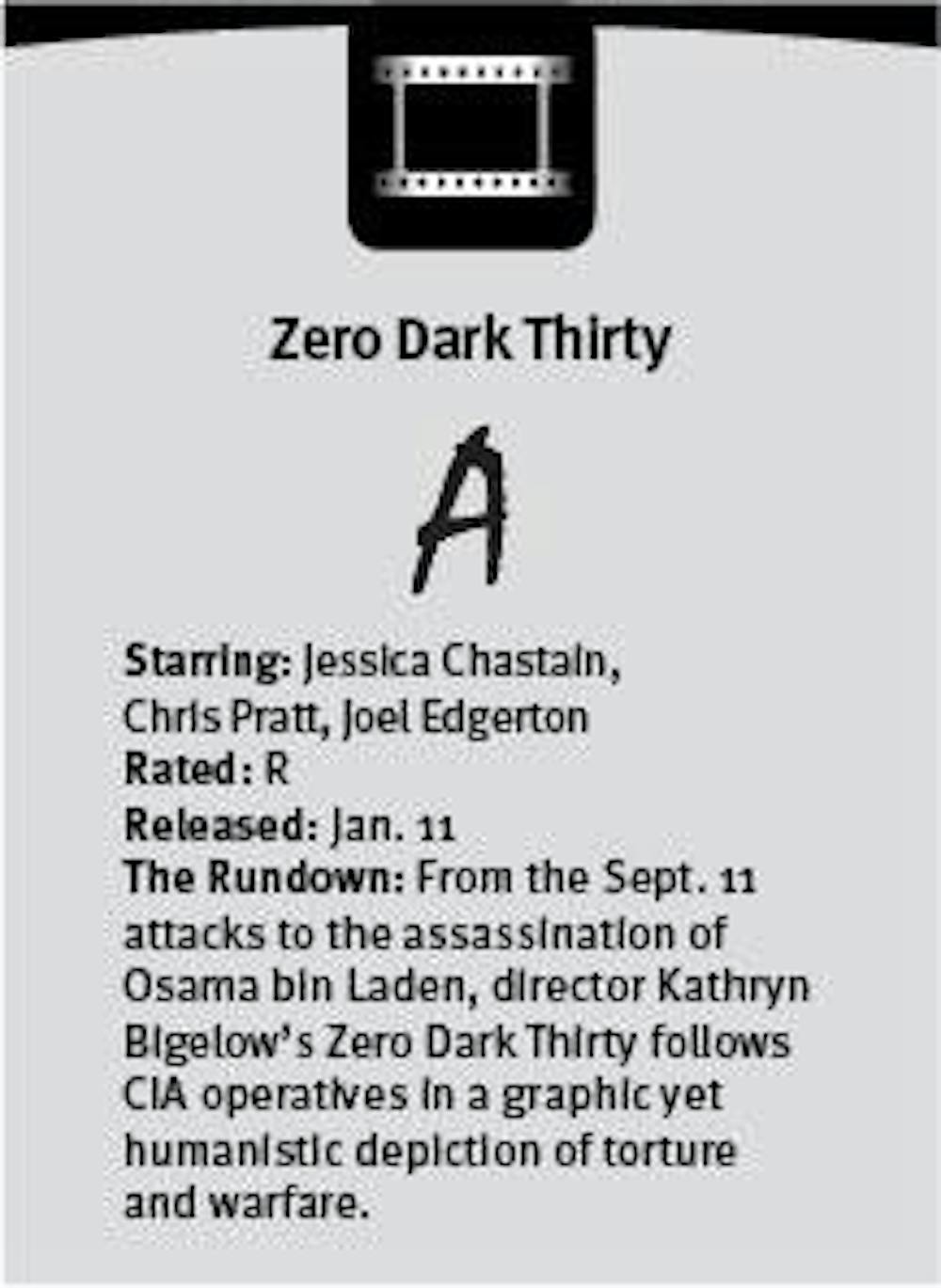Zero Dark Thirty incites controversy

Alfred Hitchcock famously remarked that he enjoyed "playing the audience like a piano." In the first scene of Zero Dark Thirty, director Kathryn Bigelow (The Hurt Locker) plays all 88 keys at once. She is faced with a serious challenge: to portray the Sept. 11 attacks in an innovative manner that will shock the audience without depicting either stock news footage or recreated images of planes crashing into the Twin Towers. In the most brilliant opening scene of recent years, the screen stays black as we listen to overlapping 911 calls from the Twin Towers. These first few minutes are terrifying and set the tone for the rest of the film: the lurid manhunt for Osama bin Laden.
After Sept. 11, the film moves to a CIA black site, a secret prison where suspected terrorists are tortured in an attempt to gather intelligence on bin Laden's whereabouts. Jason Clarke (Public Enemies) is sublime as the mysterious head interrogator, Dan. On the surface, Dan has all of the signs of a psychopath, but years of torturing detainees wear on his conscience so much that he begs for a Washington desk job. His performance drives home that most CIA interrogators are not monsters, even if their acts are monstrous. At the first black site, the audience meets Maya (Jessica Chastain, The Help). The first 45 minutes of the film follow Maya between black sites and CIA meeting rooms. The meetings are the low points of the film, primarily used to push the plot forward with confusing CIA jargon.
Chastain is the current front-runner for the Academy Award for best actress-and deservedly so: Maya belongs with Sarah Connor of the Terminator franchise and Ellen Ripley of Alien in the pantheon of female movie badasses. However, unlike these action heroes, Maya is not always heroic in her work. She has trouble with torturing detainees and has to endure great frustration when it produces little intelligence. Her entire adulthood is dedicated to her mission, and we deeply understand the psychology of someone like Maya, or William James in The Hurt Locker, whose life is completely fixated on one thing. When bin Laden is finally killed, we feel like the greatest triumph belongs to her, not the intelligence community, Navy SEAL Team 6 or even the United States.
Recently, politicians and pundits have hounded Bigelow and screenwriter Mark Boal (The Hurt Locker) with accusations that they support the torture program employed during the Bush Administration (feminist Naomi Wolf even compared Bigelow to Leni Riefenstahl, director of the Nazi propaganda piece Triumph of the Will). These accusations are based on a specious argument: that depiction implies endorsement. Quite the contrary: the film's graphic and unromantic depiction of torture suggests Bigelow and Boal's anti-torture stance. Bigelow and cinematographer Greig Fraser (Snow White and the Huntsman) shoot each interrogation scene in close-up, refusing to let audiences look away as a detainee begs for mercy or chokes during a waterboarding session. Zero Dark Thirty does not need to condemn torture explicitly. It trusts that as compassionate people, we will be repulsed that human beings treat each other so horribly in America's name. I doubt the pundits who revile Zero Dark Thirty place the same trust in the audience. Apologists of torture could perform mental gymnastics and claim Bigelow supports them if they ignore key facts of the film. For example, the manhunt for bin Laden makes no major progress until long after the detainee program ends. Would clearly articulating the inefficacy of torture improve the movie? Probably, but that is a far cry from calling it a fascistic defense of war crimes.
While the torture controversy will linger for months and is the most probable reason for Bigelow being snubbed for a best director Oscar nomination, few have disputed the artistic achievement of Zero Dark Thirty. Bigelow depicts several jihadi attacks including the July 7, 2005, London bombings, with technical mastery and powerful emotion. The audience is used to explosions in movies, but the explosions are usually just a feast for the eyes, lacking any real meaning. When a terrorist attack claims casualties in Zero Dark Thirty, the audience knows the personal or political context behind that attack. The raid on bin Laden's compound is a master class in suspense filmmaking. Many Americans already know the story of Navy SEAL Team 6, but subconsciously, the audience is still anxious. Bigelow and Boal try to make a great epic about the War on Terror, and on every level, they succeed. Zero Dark Thirty is the best American movie since
The Hurt Locker.
More from The Rice Thresher

Over 1,000 students petition against new meal plan
When Konstantin Savvon opened the Housing and Dining email announcing the new unlimited meal plan, he was instantly concerned about the impact on off-campus students like himself.

Rice football wins season opener under new coach
For the first time since 2018, Rice football opened its season with a victory. Scott Abell was soaked with yellow Powerade following a 14-12 win on the road Saturday against the University of Louisiana at Lafayette, which won 10 games and made it to the Sun Belt Conference championship last season.

Acting like an athlete: Rice basketball alum takes on Broadway
Underneath Chadd Alexander’s Broadway costume, there’s ankle tape and wrist braces — same protective gear he wore as a walk-on basketball player at Rice, though now he’s performing eight shows a week in the ensemble of “Harry Potter and the Cursed Child” instead of running conditioning drills in Tudor Fieldhouse.

Please note All comments are eligible for publication by The Rice Thresher.